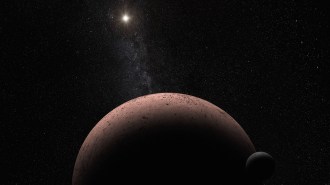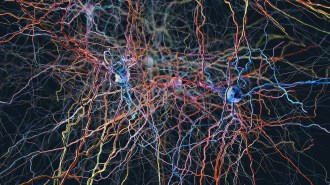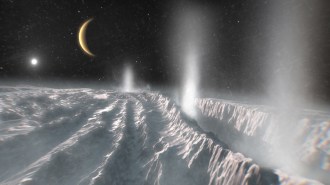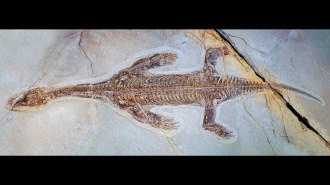All Stories
-
 Planetary Science
Planetary ScienceDwarf planet Makemake sports the most remote gas in the solar system
The methane gas may constitute a rarefied atmosphere, or it may come from erupting plumes on Makemake’s surface.
By Ken Croswell -
 Earth
EarthTwo of Greece’s most dangerous volcanoes share an underground link
Seismic and land deformation data show that Santorini and Kolumbo draw from the same magma source, complicating eruption forecasts.
-
 Microbes
MicrobesStaph bacteria are bad at letting go
Calcium, a mineral involved in wound healing, can strengthen the attachment between microbe and skin and make infections hard to shake.
-
 Health & Medicine
Health & MedicineWith little proof, Trump links Tylenol to autism and touts a treatment
The FDA plans to add a warning to Tylenol’s label and OK use of a drug for autism. Researchers say there’s little data to support either move.
- Space
This black hole flipped its magnetic field
Event Horizon Telescope data reveal the magnetic field around M87* shifted, weakened and then flipped, defying theoretical expectations.
-
 Tech
TechThis experimental computer chip reuses energy
A first-of-its-kind test shows that reusing energy within a computer chip can work, thanks to two techy tricks.
-
 Animals
AnimalsThis ‘ghost shark’ has teeth on its forehead
Spotted ratfish, or “ghost sharks,” have forehead teeth that help them grasp onto mates. It’s the first time teeth have been found outside of a mouth.
By Meghan Rosen -
 Neuroscience
NeuroscienceLung cancer plugs into the mouse brain
Exploring the relationship between cancer cells and nerve cells, which can signal tumors to grow, could unearth ways to slow disease.
-
 Planetary Science
Planetary ScienceEnceladus’ ocean may not have produced precursor chemicals for life
Building blocks of life have been found on this moon of Saturn. They may come from chemical reactions beyond Enceladus’ possible life-supporting ocean.
-
 Paleontology
PaleontologyAn ancient reptile’s fossilized skin reveals how it swam like a seal
A reptile fossil is the first of its kind with skin and partially webbed feet, possibly showing how later species like plesiosaurs adapted to water.
-

When cancer targets the young
Editor in Chief Nancy Shute discusses the troubling rise of cancer among younger adults, and shares a glimmer of hope for those diagnosed in early childhood.
By Nancy Shute -
 Humans
HumansStaying on the keto diet long term could carry health risks
Months on a high-fat keto diet put mice at risk for cardiovascular disease and impaired insulin secretion.
By Meghan Rosen